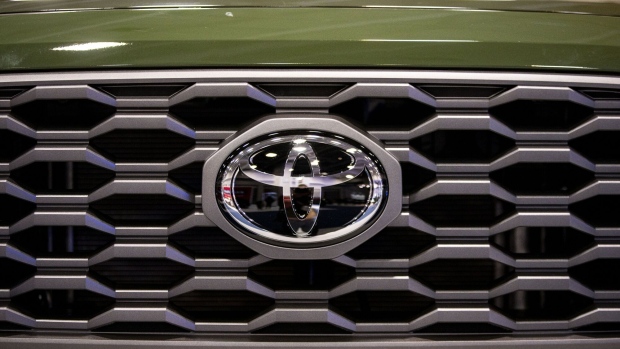Nov 1, 2023
Toyota Increasingly Confident on Outlook After Record Sales
, Bloomberg News

(Bloomberg) -- Toyota Motor Corp. raised its operating profit forecast 50% after posting record quarterly earnings, thanks to a weaker yen that’s boosting income brought back home on robust global vehicle demand and improving supply chains.
The stock climbed 4.7% on Wednesday, bolstered by the carmaker’s announcement to buy back as much as ¥100 billion ($660 million), or 0.44%, of its own shares. Operating profit should reach ¥4.5 trillion for the fiscal year through March, up from prior guidance for ¥3 trillion, the company said in a statement.
The Toyota group sold an unprecedented 5.6 million vehicles in April-September, putting it on track for its 11.4 million-unit goal for the fiscal year and remaining the world’s No. 1 carmaker. The results show that demand for its hybrid and fuel-burning powertrains persists, even as China’s BYD Co., Tesla Inc. and others take the lead in the shift to electric.
“It’s a very good result, much bigger than we expected,” Christopher Richter, senior analyst at CLSA Securities Japan Co., said of Toyota’s higher outlook. “We are in a recovery in the auto market after three years of a pandemic and the chip shortage.”
For the three months through September, profit was a record ¥1.44 trillion, exceeding analysts’ average estimate for ¥1.1 trillion. Net sales rose 24% to ¥11.4 trillion. Toyota’s shares are up 50% this year, the fifth-best performer on a Bloomberg Intelligence index of global automakers. China’s Li Auto Inc. and Tesla are the top two, having both advanced more than 60%.
Toyota lowered its EV sales goal for the current fiscal year to 123,000 units from 202,000 units. It sold 58,984 in the first half that ended September, mostly outside Japan.
The company has stepped up efforts on EVs, saying Tuesday it is investing another $8 billion in a plant in North Carolina that will make batteries for fully electric and plug-in hybrid models.
Last month, Toyota announced plans to make solid-state batteries for EVs with Idemitsu Kosan Co., an oil refiner and petrochemicals company. The partnership will focus on developing technology that could improve battery output and charging time, and help establish a supply chain for mass production.
When Koji Sato was appointed as Toyota’s chief executive officer earlier this year, he pledged to sell 1.5 million battery EVs annually by 2026, and 3.5 million by 2030. Last week at the Japan Mobility Show, he unveiled a pair of concept cars as a teaser for the EV line-up Toyota promised to roll out in 2026.
Foreign exchange gains boosted operating income by ¥260 billion during the April-September first half, and are on track to lift the full-year outlook by ¥1.18 trillion, Toyota said. The carmaker now assumes a rate of ¥141 to the dollar, instead of the prior level of ¥125.
“The plan is to make up for lost ground in China by targeting major markets like Japan and the US,” said Bloomberg Intelligence senior auto analyst Tatsuo Yoshida.
In China, sales of Toyota and Lexus brand vehicles have stagnated as car buyers switch to electric vehicles, a trend that’s also seen among other non-Chinese brands in the market.
“We’re moving forward with a plan to preserve our share in China,” Chief Financial Officer Yoichi Miyazaki said Wednesday. “Rather than get drawn into a price war, we want to compete by increasing volume.”
--With assistance from Supriya Singh.
(Updates with comments from CFO, analysts.)
©2023 Bloomberg L.P.


